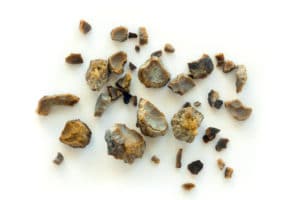Kidney Stones: What You Need to Know
If you have any questions, to schedule a consultation or if you need a second opinion, please contact us or call: 646-663-4421
Dr. Alex Shteynshlyuger is a board certified urologist in NYC who specializes in treating men and women with kidney stones and ureteral stones. We offer weekday, weekend, and evening office hours.
What are Kidney Stones?
 The kidneys filter waste material and toxic substances from the blood. People are born with two kidneys and each of them works to remove the by-products of metabolism from the body in the form of urine.
The kidneys filter waste material and toxic substances from the blood. People are born with two kidneys and each of them works to remove the by-products of metabolism from the body in the form of urine.
Occasionally, minerals and salts bind together to form solid masses called kidney stones or renal calculi. In medical terminology, the condition is known as renal lithiasis or nephrolithiasis. Kidney stones usually occurs when certain minerals and acid salts are present in high concentration in the urine. In other words, a highly concentrated urine with not enough fluid in it allows the minerals to crystallize and stick together to form kidney stones.
Some people have genetic predisposition to kidney stones. Other people have an underlying problem that leads to kidney stone formation such as abnormally high parathyroid hormone from an adenoma (parathyroid nodule).
Kidney stones can range in size from as tiny as a sugar crystal to as large as a ping pong ball. Renal calculi can be found in any part of the urinary system – the kidneys, the ureters, the urinary bladder, or the urethra. Tiny kidney stones can often pass out of the body with the urine with minimal to no symptoms.
When do Kidney Stones Cause Pain?
Larger stones can break loose from the kidneys and get stuck in a narrow part of the urinary tract, such as the ureter (the narrow tube that carries urine from each kidney to the urinary bladder). The ureter is normally only about 3 mm in diameter. When a kidney stone blocks or obstructs some part of the urinary tract, the person experiences symptoms such as intense pain and sometimes blood in the urine. The pain caused by kidney stones is called renal colic, and the condition is one of the most painful medical conditions.
If you have any questions, to schedule a consultation or if you need a second opinion, please contact us or call: 646-663-4421
We offer affordable, highest-quality urology care. We offer weekday, weekend, and evening office hours.
